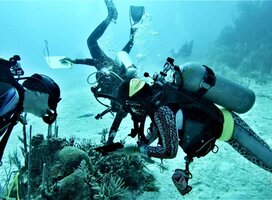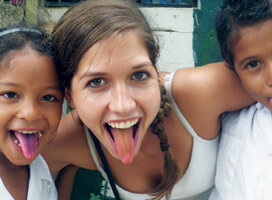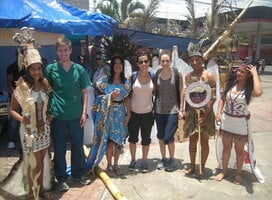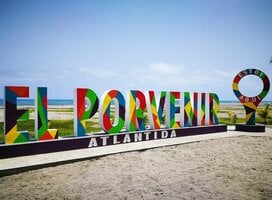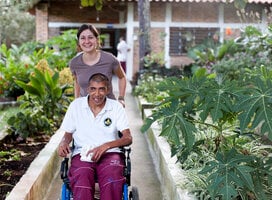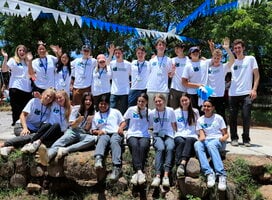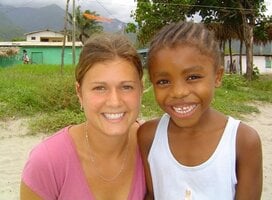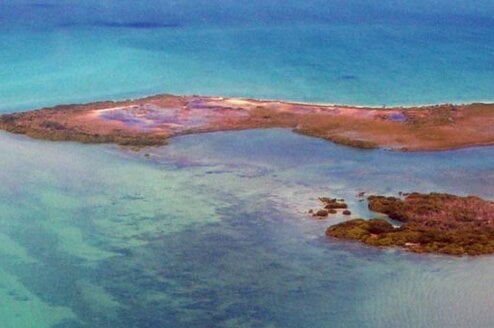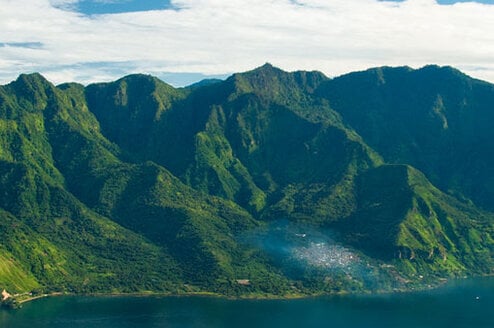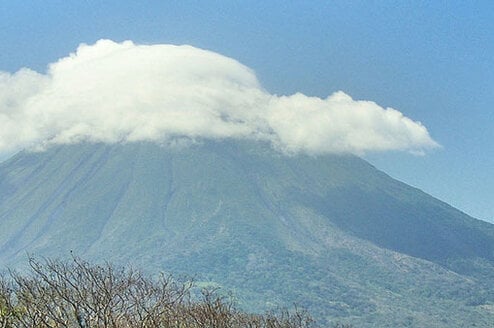Gap Year in Honduras
Honduras offers a buffet of options for gappers who long for adventure off the beaten path. From diving off Utila and exploring Copan’s vast Mayan ruins, to sailing on Lake Yojoa and sun-bathing in Tela, Honduras has many ways to ease your adventurous itch. Not only that, Honduran schools often need English speakers to teach ESL, offering the wayward traveler a great way to fund that gap year. The result: The ideal combination of travel, work, and making a difference in the local community. So get off that beaten path! Expand your worldview and give back to others in Honduras.
Volunteering
Outsiders often visit Honduras to conduct missionary work, teach ESL, or explore its natural wonders. Since the country is less developed and comprises a predominantly Christian population, North American Christian communities often see it as an opportunity to provide resources to local communities. These communities also have a high demand for ESL teachers, often posting openings through online databases or third parties. Though the possibility for altruism entices many potential gappers and ESL teachers, the “icing on the cake” is the country’s myriad natural gems, including mountains, beaches, lakes, and benign volcanoes.
Eco-tourism
Eco-tourism constitutes a huge contributor to the tourist sector, due to the country’s numerous national parks and reserves, cloud forests, and botanical gardens. Outside Tegucigalpa, La Tigra National Park hosts an expansive cloud forest, hiking trails, and a wide variety of birds, flora, and fauna. Along the country’s northern coast, Pico Bonito National Park offers ample opportunities for hiking, kayaking, and bird-watching along its pristine rain forests. Surrounded by the Santa Barbara and Cerro Azul Mountains, Lake Yojoa provides sanctuary to almost 400 species of birds, making it an ideal spot for bird-watching, hiking, and boating.
To the east, the rainforests of La Mosquitia’s Rio Plátano Biosphere Reserve comprise an abundance of plant and wildlife species, while also preserving the way of life for over 2,000 indigenous people. This reserve is ideal for conscientious backpackers yearning for serious hiking and boating exploration. If water sports are more your style, visit the crystal-clear waters of the Bay Islands. This area boasts the Mesoamerican Barrier Reef System, the second largest expanse of coral reef in the world. Each year, backpackers shed their winter gear, jetting down to Utila and Roatan to get their diver’s license or enjoy a laid-back day on the beach. Looking to dive and intern? Though the number of diving programs seems limitless, to get started, check out these lists of companies in Utila and Roatan. For more information on ecotourism in Honduras, check out Planeta.
Teaching English
The universal push to learn English, and the hope of a better life because of this skill, makes many Honduran schools yearn for more ESL teachers. Private bilingual schools constitute the greatest desire, highly valuing English-speakers – regardless of experience – for their program. Typical work hours range from 7:30-3:00, Monday through Friday. Schools typical run from mid-August through mid-December, and resume from January through June. Most schools do not require knowledge of the Spanish language, TEFL certification, or even teaching experience. They do usually ask for applicants with a college degree or some college experience. Popular teaching locations include Roatan, Gracias, Peña Blanca, Siguatepeque, and Copán Ruinas.
Volunteering
Due to its underdeveloped economy and often limited resources, Honduras – and particularly its smaller towns – often hosts mission and volunteer work. United Planet offers a variety of gap year opportunities in education, health care, and community development. Similarly, AFS provides volunteer programs geared toward community development. Amerispan works through local orphanages, hospitals, and the Red Cross to provide mutually meaningful volunteer work in areas including La Ceiba and the Lake Yojoa region. For similar opportunities in healthcare and orphanages, consider Volunteer Solutions or A Broader View. Regardless of your location, impromptu volunteer options exist, so check out the local orphanage or ask around for opportunities.
Since Honduras usually doesn’t make the list of popular tourist destinations in travel magazines, gappers might worry that less information exists on planning for this type of excursion. Though this may be true, there are still plenty of websites to get the job done. First, study up on the country using the CIA World Factbook. Similarly, research travel, health, and visa considerations through the U.S. Department of State. Next, visit the UK’s government page and Lonely Planet for excellent travel advice on the country.
In planning excursions, read travel tips on International Living and Sidewalk Mystic, and check out reviews of specific locales on Honduras.com and the Virtual Tourist. If you plan to work and travel through a particular company, contact them and ask for their recommendations on travel tips and what to pack. In particular, try to pack cosmetics and other similar luxuries, as these will likely be more expensive, especially if you will be living in a smaller town. Gappers should note that there are two seasons: rainy (May to November) and dry (December to April). Decide when you plan to travel and pack accordingly. The Bus Schedule will soon become your new best friend. While planning which sites you’ll see, refer to it often for bus times and locations.
Cost of Living in Honduras
On the whole, living in Honduras is considerably cheaper than more developed countries. The average monthly cost of living ranges from $350 - 550, or $11.66 - 18.33 daily. In addition, monthly rent typically ranges from $100-250. Gappers should note that certain volunteer and teaching programs provide free housing and utilities, with teaching often yielding a small salary. English-speaking travelers often receive opportunities to tutor English privately. In this case, a reasonable hourly rate is $10-15, but one should certainly consider the financial situation of the tutee.
Health and Safety in Honduras
Honduras offers a variety of fresh fruits and vegetables. When preparing produce, make sure to disinfect it with a combination of soap and hot water. With regards to sanitation, travelers should be advised against drinking untreated water and instead boil it or purchase bottled water. Similarly, the sewage system is in poor repair. Travelers should throw away, not flush, used toilet paper. The quality of health care tends to vary depending on the size of the city. For general care, most smaller offices suffice, with prescriptions often decently priced. Though the country requires no vaccinations, cases of malaria in the Bay Islands exist. If you plan to live in this area, consider purchasing medication. For more information, check out the CDC’s website.
In terms of safety, exercise caution and avoid traveling alone in big cities. In these areas, theft and violence abound, so avoid conspicuous use or display of wealth in public places (e.g. iPhones, expensive jewelry, etc.). In 2012, the UNODC ranked it highest in per capita homicide in the world, and the Peace Corps suspended its programs there. That being said, these concerns apply almost exclusively to San Pedro Sula and Tegucigalpa. Smaller towns tend to be safe and quite welcoming to outsiders. Regardless, a smart traveler stays aware of his or her surroundings. Practice common sense! No stopping at the ATM at 3:00 in the morning.
Culture and Etiquette
Hondurans are typically warm and welcoming. They often greet with a combined hug and kiss on the cheek. If employed, consider letting you supervisor make the first move, since s/he may prefer a handshake. Locals often welcome new friends into their homes and lives. That being said, reciprocity is expected, so travelers should try to exercise an “open door” policy. In doing this, you’ll quickly find entrance into a new group of friends, paving the way to an enjoyable, meaningful experience.
Since Roman Catholicism constitutes the predominant religion, the culture tends to be more traditional. Unless exercising or enjoying one of the many ecotourism options, avoid short shorts and low-cut shirts. In smaller towns, employers may frown upon their employees going to bars, and may even specifically take issue with females doing so. Be aware of this when deciding upon recreational activities. In addition, gappers should be aware that Hondurans typically are not too open to homosexuality. This is certainly not to dissuade homosexual travelers from experiencing the country. Rather, exercise awareness of your surroundings and be cognizant of advertising your actions or relationships.
The ubiquity of personal weapons often constitutes the biggest culture shock for travelers. Many workers carry a machete, their livelihood, up to the mountains to landscape. It just happens to double as personal protection. Some local grocers often stand outside their establishments toting a machine gun. Random check points occupy highly used roads from time to time. Travelers should note that Hondurans use these weapons and considerations as means of self protection, and they are not directed toward innocent people. Regardless, travelers should still exercise a healthy amount of caution.

